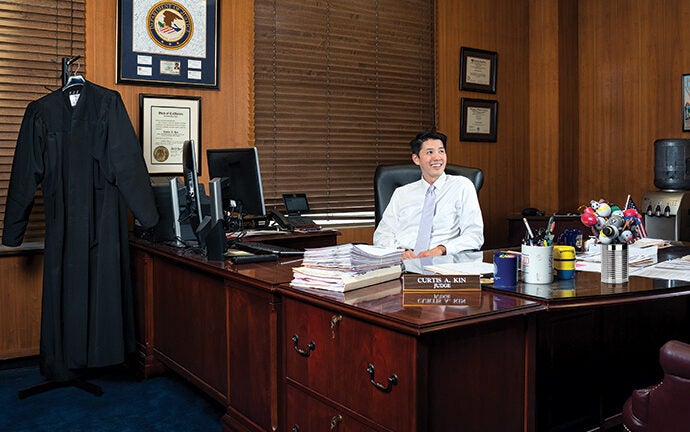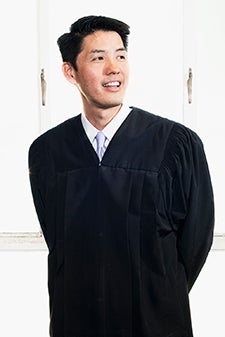
Good Judgement: Curtis Kin
With his easy laugh, even keel and boyish face, Curtis Kin is immediately likeable. Perhaps the type of guy you would cast in a reality television show as a foil to the more outrageous characters. It stands to reason, because Kin is exactly that, having been cast in the first season of the American edition of the CBS television show Big Brother, back when the whole reality TV phenomenon was a nascent strain in our culture.
As a 29-year-old in the summer of 2000, Kin and nine strangers lived together in a house where they were under near constant surveillance. For 88 days, scores of cameras and live Internet feeds laid bare the contestants’ existence. Individual housemates were regularly evicted — by vote of the American public — as they competed for a final cash prize, reserved for the last person standing. The show aired six nights a week on primetime television. America knew Curtis Kin.
“Overall it was a positive experience,” Kin mused. “I think I learned a lot from it and had a lot of fun doing it.”
Does he still get recognized in public? He said it took years to not be.
“Over time it morphed from being recognized as Curtis from Big Brother to people having this general sense that they knew me but couldn’t quite place me. Now it’s finally gone away entirely.”
Indeed, 15 years later, the experience seems distant. Kin’s public recognition now comes from a very different source — he is currently a judge for the Superior Court of California in Los Angeles County. California Gov. Jerry Brown appointed him to the position in 2013. Prior to that, Kin was chief of the Criminal Appeals section at the U.S. Attorney’s Office for the Central District of California, the office he had worked in since his stint on Big Brother.
“I had a great career at the U.S. Attorney’s Office, and what I loved the most is the fact that I was able to change things up every few years,” he said. “I was able to do a lot of different things and always be able to challenge myself.”
Kin started out working on general crimes, as rookie prosecutors often do, then he moved on to white collar crimes and fraud, eventually becoming a supervisor in the office for the trial unit. In 2009, Kin successfully prosecuted the largest human sex trafficking case ever tried to verdict by the U.S. Department of Justice. The feat garnered him the Attorney General’s Award for Distinguished Service. Criminals knew Curtis Kin.

“I had a great career at the U.S. Attorney’s Office,” said Kin.
“That was really gratifying, working with the victims of those crimes and being able to vindicate them,” Kin said. “As a result of that case, I learned quite a bit about how to work with victims and investigate and build a case for trafficking. Thereafter, I served as the coordinator for the human trafficking unit at the office. I was fortunate to travel around the country and internationally, teaching law enforcement officers and victims’ rights advocates about sex trafficking and how to combat it. It was a very rewarding part of my career.”
Kin grew up in Tustin, Calif., the youngest of three children. As a teenager in the late ’80s, “back when L.A. Law was big,” Kin developed an interest in the legal profession that followed him to USC Dornsife. He majored in international relations and graduated in 1993 before going on to Stanford Law School and earning his J.D. three years later.
Within the first few years of practicing, Kin knew he wanted to be a trial lawyer and a prosecutor. But, after law school, he served as a clerk for a couple of judges — including future U.S. Supreme Court Justice Sonia Sotomayor. The judicial experience inspired him. Eventually he was able to work in both areas.
“At the end of the day, what I love most both as a judge and in my former role as a prosecutor is the truth-seeking function of the courts, where you’re always trying to do the right thing and reach the right result. As a judge, it’s nice because you’re no longer on one side or the other, you’re just trying to make the best decision based on the facts and arguments presented.”
Kin comes from a USC family: His parents and his sister attended the university. USC Dornsife certainly prepared him for his law career, he said. As a freshman, he participated in the Thematic Option program, a rigorous interdisciplinary core curriculum that offers small classes and top professors and writing instructors.
“I think that very intense year may have been one of the more influential experiences in terms of shaping my ability to write.
“As a federal prosecutor, writing is constant,” he continued. “At the end of the day, a lawyer is a purveyor of information in a persuasive way. It can be oral, but most often it’s going to be in written form. Particularly in federal cases, decisions are made mostly on the basis of the briefs and written submissions. So all of the writing really matters.”
Kin took part in all kinds of activities at USC, from being a resident adviser and orientation adviser to being a Pi Kappa Alpha fraternity president, a campus tour guide and a member of the choir.
“I loved USC. It was such a great experience and those really are your formative years. I felt I walked out of there very well-rounded.”
In some ways, his experience on Big Brother still relates to his current life and career, as well.
“The biggest lesson I’ve taken away is that the way you conduct yourself in your private and public life should be the same. That’s been helpful for me as a prosecutor and a judge — as a public figure. The person you present to the outside is the person you should be in chambers, at home and in your private communications: straightforward and honest.
“Some attorneys really enjoy the spotlight and media attention, but I think as a result of Big Brother, it doesn’t matter as much to me. For my cases, no matter how big, the focus was always on the case. I suppose the novelty of the public spotlight just isn’t there for me after Big Brother.”
Curtis Kin knows himself.
Read more stories from USC Dornsife Magazine‘s Fall 2015-Winter 2016 issue >>